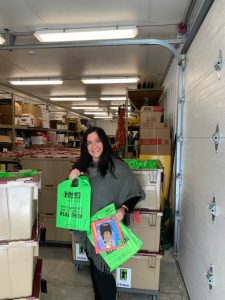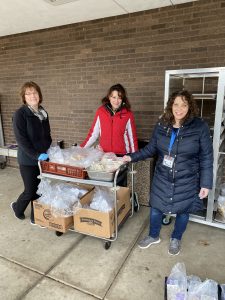Every aspect of learning and teaching has changed as a result of the pandemic. While educators are concerned about their students still gaining academically, there are other equally important worries. Among them is how to make certain the children have essentials such as food, one-to-one electronic devices, WIFI access, and personal connections during this time of isolation. Schools are often the place to find solutions to these issues. They still are, even though the doors are temporarily locked due to the coronavirus (COVID-19).
Redbird educators are relying on their ability to problem-solve and spark collaborative efforts within their staff ranks as well as communities to meet the needs of P-12 children. While administrators cannot bring back normalcy immediately, alumni from the College of Education have found ways to lift up their students in districts of all sizes across the state.
West Chicago
Many districts across Illinois serve free meals twice daily to a high percentage of students. To assess needs, Elementary School District 33 Assistant Superintendent Gloria Trejo ’96, M.S. ’00, helped get a survey to families before school closures began.
“Luckily, we have been able to serve many of our families with breakfast and lunch during a range of times that make it accessible for families, no questions asked,” she said. In addition to setting up car lines, the district keeps a fully stocked food pantry located at one of the schools. Community members can request the food staples that are sold out at many grocery stores.

Gloria Trejo secured a huge stock of new books for students to pick up by partnering with Bernies Book Bank. The most important thing to have your kids do is to read, read, read. Getting books in the hands of students.
Securing essential educational resources has been a large part of Trejo’s role during the school closures as well. She led the team that acquired the large number of hotspots needed to facilitate remote education for students. To bolster offline learning, she partnered with Bernie’s Book Bank to provide droves of new reading material for students.
Early in the process the district decided to label their instructional delivery as “e-caring” in lieu of e-learning. “E-caring was a different way to make sure the parents know that our goal is not just to provide the curricula students need,” Trejo said, “but to focus on the social-emotional aspects of what is happening too.”
Peoria
Peoria Public Schools (PPS) has nearly 13,000 students and 70 percent are from low-income families. As of last week, the district had provided more than 100,000 meals for students.
Superintendent Sharon Desmoulin-Kherat, Ed.D. ’06, credits the accomplishment to strong partnerships with the Peoria County Regional Office of Education, the Salvation Army, and 90-plus volunteers who are delivering door-to-door services to community members.
During the mandated school closures, Dr. Desmoulin-Kherat said PPS has identified three priorities. “We need to feed our children; account for the extended safety, health, and welfare of our almost 16,000 students and staff; and clearly communicate and implement the continuity of learning.”
Ensuring that PPS staff are in a good place mentally and physically has also been crucial during the pandemic. “I truly believe that we have to take care of ourselves in order to take care of others,” she said.
This priority spurred creation of the district’s Positive Personnel Support Matters (#PPSmatters) team, composed of social workers, teachers, and other staff members.
“This team’s mission is to help us all stay focused on self-care and caring for each other during this time and beyond. As a district, we are united in saying, ‘Remember, this is marathon, not a sprint.’”
South Suburban Chicago
At Westmont Junior High, Assistant Principal Amy Quattrone ’97 said the pandemic has galvanized support within the community. One family, for example, donated 30 grocery store gift cards for those in need.
A mobile memorial was also built so that residents, village workers, and district staff could contribute personal notes for the families who are losing love ones due to COVID-19. “The sign is currently travelling through our community, eliciting a spirit of connectedness and hope in these difficult times,” Quattrone said.
Administrators and staff are delivering meals directly to families’ homes. They also recruited a food pantry to provide an extra five days’ worth of food to families at the beginning of the outbreak, when grocery stores couldn’t keep pace with huge demand.
“Giving back to your neighbors helps to unite the community and bridge some of the economic and social gaps that exist,” Quattrone said. “It fosters equity and social responsiveness, and in the end, creates a thriving, successful place to live.”
Editor’s note: Redbirds are doing an amazing job of collaborating and inspiring others during this crisis. Share the ways your school or district is managing the COVID-19 outbreak at Alumni.IllinoisState.edu/Update.


